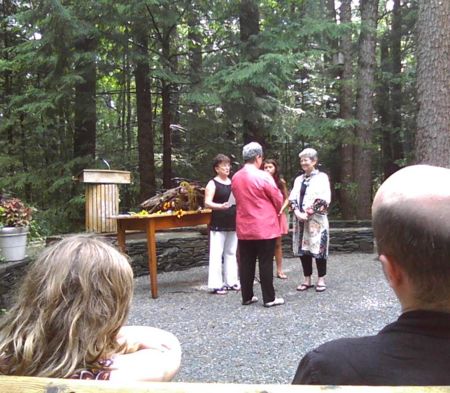Saco, Maine — I’m at Religious Education Week at Ferry Beach, the Universalist conference center in Maine, taking a class in religious education. One of the people in my class had a big church wedding down in Texas several months ago, which wasn’t a legal wedding because she and her wife are both women. With the recent Supreme Court decision against the federal Defense of Marriage Act (DoMA), their advisors told them that they should have another wedding in a state which sanctions same-sex marriage; Maine, of course, is one of those states. So right after class was over, we all walked over from where we were meeting to the chapel in the grove, and there, under the pine trees still dripping with rain from a passing shower, they were legally married in a brief but meaningful ceremony.

Our teacher and one of our classmates were the witnesses who signed the wedding documents. They fed us cake and champagne after the ceremony.
It is worth stating the obvious: one effect of the recent Supreme Court decision is (and will be) marriages like this one; even if a same-sex couple can’t be legally married in the state in which they reside, by getting legally married in a state which recognizes same-sex weddings, they can still access some federal marriage benefits. (And I’m thinking that if I’m asked, I would perform such brief ceremonies for out-of-state same-sex couples at no charge.)
